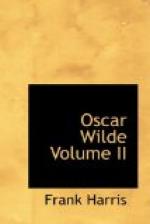[Footnote 7: This is an inimitable picture, but Shaw’s fine sense of comedy has misled him. The scene took place absolutely as I recorded it. Douglas went out first saying—“Your telling him to run away shows that you are no friend of Oscar’s.” Then Oscar got up to follow him. He said good-bye to Shaw, adding a courteous word or two. As he turned to the door I got up and said:—“I hope you do not doubt my friendship; you have no reason to.”
“I do not think this is friendly of you, Frank,” he said, and went on out.]
[Footnote 8: I am sure Douglas took the initiative and walked out first.
I have no doubt you are right, and that my vision of the exit is really a reminiscence of the entrance. In fact, now that you prompt my memory, I recall quite distinctly that Douglas, who came in as the follower, went out as the leader, and that the last word was spoken by Wilde after he had gone.—G.B.S.]
“What your book needs to complete it is a portrait of yourself as good as your portrait of Wilde. Oscar was not combative, though he was supercilious in his early pose. When his snobbery was not in action, he liked to make people devoted to him and to flatter them exquisitely with that end. Mrs. Calvert, whose great final period as a stage old woman began with her appearance in my Arms and the Man, told me one day, when apologizing for being, as she thought, a bad rehearser, that no author had ever been so nice to her except Mr. Wilde.
“Pugnacious people, if they did not actually terrify Oscar, were at least the sort of people he could not control, and whom he feared as possibly able to coerce him. You suggest that the Queensberry pugnacity was something that Oscar could not deal with successfully. But how in that case could Oscar have felt quite safe with you? You were more pugnacious than six Queensberrys rolled into one. When people asked, ‘What has Frank Harris been?’ the usual reply was, ‘Obviously a pirate from the Spanish Main.’




